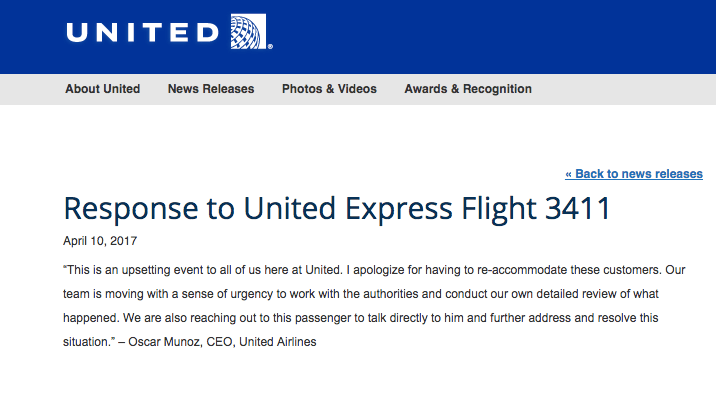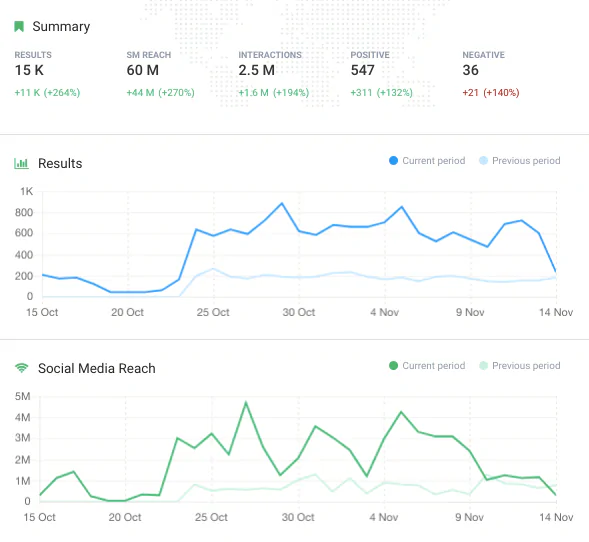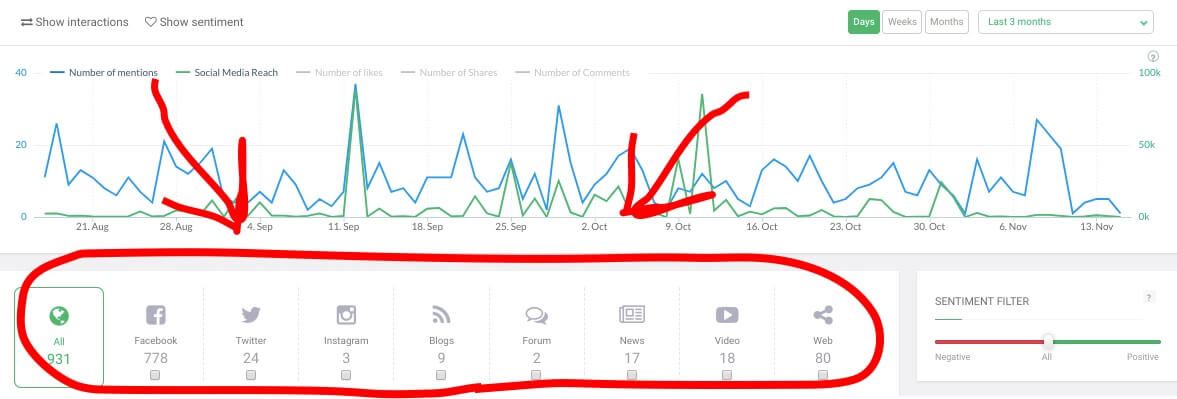How CEO Reputation Management Shapes Your Business: Top 5 Insights
It’s not uncommon anymore to see politicians, celebrities, or CEOs of companies of all sizes actively participating in social media.
Whether you like them or not, Barack Obama, Donald Trump, Elon Musk, Richard Branson or Arnold Schwarzenegger have already discovered its potential in terms of communication with audience, engagement, establishing authority and reputation management in business and politics.
Thanks to social media, gone are the days of CEOs locked in their offices beyond the reach of the outside world. Now you can tweet with Fortune 500 CEOs!
Having this in mind, online reputation management has become yet another area of business a CEO should embrace and take care of.
This video explains the basic concept of online reputation management, including 2 important aspects that need to be considered to do it well:
After surveying 1,7k execs, Weber/KRC drew following conclusions:
- 45% of executives connects the company’s reputation directly with the CEO’s reputation
- 50% of a company’s reputation is attributed to a CEO’s reputation
- 50% believes that this connection will become even stronger in the coming years
Surveys and researches leave no doubt — CEO reputation management is gaining importance.
There are at least five good reasons to take care of CEO reputation management:
- It helps establish the position of industry expert for company
- It influences purchasing decisions
- It builds a company’s brand reputation
- It helps when things go south
- It attracts shareholders
Now, let’s have a closer look at each of them.
Good CEO Reputation Management Helps in Establishing the Position of Industry Expert
As a CEO, you and your company have one primary goal — to get customers.
Good CEO reputation management and expertise work as a selling card for the business. You can improve your reputation by establishing yourself and your company as industry experts.
In fact, that’s what you should be already doing.
Thought leaders do not become thought leaders by trying to be one; that’s an external focus that only satisfies the ego and blocks true enlightenment on any subject. A thought leader has a singular, internal focus on achieving mastery of a particular discipline.
Business leaders should aim at becoming thought leaders within their niche. They need to strive for knowledge, expertise and, what’s similarly important, be willing to share their opinions and experiences, as it builds their credibility in the eyes of potential customers.
The best CEOs are aware that their industry and consumers expect them to share their thoughts on relevant topics: current trends, new ideas and the future.
It builds trust in the eyes of consumers and increases the chances of converting them into your customers.
Good CEO Reputation Management Helps in Influencing Purchasing Decisions
As mentioned earlier, the position of an industry expert and willingness to share expertise and engage with an audience work wonders in terms of sales.
Thoughtful CEO reputation management is a must and it’s strongly connected to your business — it’s basically another marketing channel which brings solid customers.
As a proactive CEO, you share your insights and engage with your followers, you’re open to a debate not only about the industry but also about the brand, product or service you own.
Such openness, transparency and care are a benefit to customers at the face value — it proves that the CEO takes full responsibility and is willing to discuss any topic, including one’s tool or product and related questions.
Good CEO Reputation Management Helps in Influencing Company Brand Reputation
Good CEO reputation equals good company brand reputation.
- 50% of a company’s reputation is attributed to a CEO’s reputation
A CEO’s attitude and reputation should set standards for the company, employees, communication and approach towards customers.
At least this is what customers expect and perceive business leaders and their companies. It’s important to remember about this connection and hone brand reputation it also on the company’s end.
If you, as a CEO, respond to your customers seeking assistance via your social channels, your customer will also expect your customer service department to be this flexible.
Good CEO Reputation Management Helps When Things Go South
Bad PR, social media crises, rumors and fake news happen to the best.
To be aware of web and social mentions about you and your business, you should use a social media monitoring tool. Only then you can spot, for example, bad PR in the nick of time.
Then you can react immediately before a fake news, negative comment escalate into something bigger, something that can scare off potential customers.
If, however, it’s too late, you, as a CEO, are the most effective PR officer to tackle such issues.
Good CEO reputation management, transparency, honesty and strong social media presence ensure that you’re the best weapon to combat a crisis.
Own your story and spread it via your social channels — it’s the most accurate source of news and publicity about your company and yourself.
Just in case, please don’t do it like the CEO of United Airlines:

Good CEO Reputation Management Attracts Shareholders
As mentioned earlier, a CEO’s reputation might be considered a valuable asset for shareholders.
When Tim Cook became Steve Jobs’ successor, investors reacted and reduced Appe’s shares by 5%. This, however, doesn’t always have to be the case. Strong CEO’s reputation might increase the confidence of investors.
Good CEO reputation management, engagement and responsibility are indicators of involvement that most likely translate into business successes.
How to Hone Your CEO Reputation Management?
Good CEO reputation management takes time and effort as you need to devote more time to building your social media presence.
Nevertheless, it’s totally worth the effort.
- Use a social media monitoring tool to monitor relevant keywords and spot web and social media content mentioning your name and the name of your company: social media content, news, comments, blogs, etc.
- Set up your social media profiles and use them — share your insights, new tools, results, valuable pieces of content and engage with your audience. Social media monitoring can help here when users talk about you, but don’t mention you using handles.
- Engage in charitable activities — use your social media reach (again, social media monitoring can help with calculating it) to do good — share and encourage your followers to donate to charities.
- Respond to as many questions as possible and show your followers, customers and potential customers that you care.
- Spread the good word about your business — share with your followers all positive pieces of content about you, or your company — mentions in influential magazines, awards or examples of positive feedback.
- Reflect on business results — talk about successes, failures, provide unique insights that may benefit your followers.
- Appreciate publicly your employees — be accessible, connect with them, provide them with opportunities and appreciate their achievements in social media.
Make Your Life Easier with Social Media Monitoring Tools
I’ve already mentioned a couple of scenarios when social media monitoring tool might come useful. There’s, however, much more to it.
Apart from spotting online content mentioning your and your company name, social media monitoring tools have rich analytical capabilities which can help you track various social-media-related KPIs, such as:
- Social media reach of your mentions

- Volume of your mentions

- The most influential sites mentioning your keywords
- The most influential social media produ
- Sentiment analysis
Some social media monitoring tools offer convenient solutions so that you never miss a mention, such as Slack integration, email reports or mobile apps.
Conclusion
CEO reputation management is a powerful tool indeed.
Not only does it influence your company brand reputation, but also attracts customers, builds trust in investors and helps manage PR crises.
Are you already managing your CEO reputation like a pro? Share some examples of what you do and what works for your audience.
BTW, if you feel like social media monitoring is something you need, try it out for free.
FAQ
What is CEO reputation?
CEO reputation refers to the perception stakeholders, including employees, customers, investors, and the broader public, have of a company’s Chief Executive Officer. It involves the CEO’s personal brand, their values, leadership style, communication, transparency, and decision-making.
A CEO’s reputation goes beyond their professional accomplishments; it also encompasses their personal traits and behaviors. It plays a crucial role in how both internal and external audiences view the company itself.
For global executives, maintaining a positive reputation is even more critical due to the worldwide visibility of their actions and decisions. It can greatly impact the company’s brand image, consumer trust, investor relations, and overall business success. This is why many organizations invest significant resources into CEO reputation management.
How does a CEO behave?
A CEO’s behavior, crucial in shaping their online reputation, generally involves the following:
- Transparent Communication: CEOs engage openly with stakeholders, sharing accurate company information and managing expectations.
- Professional Conduct: They maintain high ethical standards in all personal and professional dealings.
- Strategic Decision-Making: CEOs make well-informed, strategic decisions aligned with the company’s goals.
- Analyst Engagement: CEOs interact with financial and industry analysts, shaping the company’s image among investors and the broader industry.
- Handling Negative Publicity: CEOs proactively and responsibly manage negative publicity, often with the help of PR professionals.
- Thought Leadership: Many CEOs contribute to industry discussions and maintain an active online presence to boost their reputation and that of their company.
What does a reputation management company do?
A reputation management company specializes in creating and sustaining a favorable perception of a brand within the company’s market and online. Their core reputation management services include:
- Monitoring: They constantly monitor the reputation online, tracking mentions of the client on various platforms.
- Strategy Development: They formulate strategic plans to construct, uphold, or restore the client’s reputation.
- Content and SEO: They generate positive content and employ SEO tactics to ensure visibility in search engine results.
- Crisis Management: They are equipped to manage potential crises that might harm the client’s reputation.
- Review Management: They handle online reviews, responding to negative ones and promoting positive feedback.
These services collectively ensure the client maintains a positive reputation in their company’s market.





